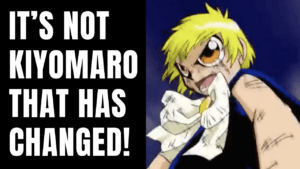Let’s learn Japanese with Mikoto Misaka’s quote from A Certain Scientific Railgun (Toaru Kagaku no Railgun).
CONTENTS
Video
Mikoto Misaka’s Quote
Japanese: 私が飛ばせんのはコインだけじゃない!これが私の全力だー!!!
Romaji: watashi ga tobasen no wa koin dake janai! kore ga watashi no zenryoku da!!!
English: It’s not just coins I can shoot! This is my full strength!!!
Analysis
Let’s break down the first sentence, 私が飛ばせんのはコインだけじゃない. The sentence structure is A は B じゃない which means “A is not B”. は is the topic particle which indicates A is the topic of a sentence and じゃない is used to make a sentence negative.
First let’s look at the A 私が飛ばせんの which is a noun clause (= a clause which can act as a noun).
私 means “I”.
が is the subject particle. You might want to use は here but basically you have to use が to mark a subject in a subordinate clause, whereas は is used to mark a topic in a main clause.
飛ばせんの is a combination of a verb 飛ばせる meaning “can fly something” or “can shoot something” and the particle の which makes what comes before into a noun and it can be translated to “the one which”. In very informal speech, when the verb that ends in る is followed by the particle の, る often becomes ん as it’s a bit easier and faster to pronounce. For example, するの becomes すんの, 食べるの becomes 食べんの, 来るの becomes 来んの, and so on.
So 私が飛ばせんの means “the one which I can shoot”.
Now let’s look at the B. コイン means “coins” and だけ means “only” so コインだけ means “only coins”.
So the whole sentence 私が飛ばせんのはコインだけじゃない is, if it’s translated directly, “the ones which I can shoot are not only coins”. So it means “it’s not just coins I can shoot” or “coins aren’t the only things I can shoot”.
Now we’re going to look at the second sentence, これが私の全力だ.
これ means “this”.
が is the subject particle and this が is used to emphasise これ as Mikoto is showing THIS which is something Therestina has never seen.
私 means “I” and with the particle の, you can make it possession, so 私の means “my”.
全力 means “full strength”.
だ is used to make a sentence affirmative and declarative so it’s opposite to じゃない.
So これが私の全力だ means “This is my full strength”.
Examples
Subject Particle が
used in subordinate clauses
昨日私が見た映画はとても良かった。
kinō watashi ga mita eiga wa totemo yokatta.
The movie I watched yesterday was very good.
母が電話をくれたとき、私は会社にいた。
haha ga denwa o kureta toki, watashi wa kaisha ni ita.
When my mother gave me a call, I was in the office.
私が最近読んでいる本はファンタジー小説です。
watashi ga saikin yondeiru hon wa fantajī shōsetsu desu.
The book I am reading these days is a fantasy novel.
emphasis
見て、あれが富士山だよ。見たことないでしょ?
mite, are ga fujisan dayo. mita koto nai desho?
Look, THAT is Mt. Fuji. You’ve never seen it before, right?
こちらがいま話題のニンテンドースイッチです!
kochira ga ima wadai no nintendō suicchi desu!
THIS is the currently popular; Nintendo Switch!
あの男が痴漢です!早く捕まえて!
ano otoko ga chikan desu! hayaku tsukamaete!
THAT man is the groper! Catch him quickly!
Verb That Ends in る → ん + の (noun clause)
走んの速いね!
hashin no hayai ne!
You run fast!
明日のパーティに来んの、誰?
ashita no pātī ni kun no, dare?
Who is coming to the party tomorrow?
寝んのはいつも12時くらいだよ。
nen no wa itsumo jūni-ji kurai dayo.
I always go to bed around 12 o’clock.
Support Easy Peasy Japanesey
If you enjoy our content, please consider supporting Easy Peasy Japanesey. Your support will help keep us going. Thanks for all your support!


